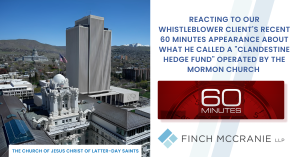Sean McKessy of the SEC Whistleblower Program is right to continue his mission against muzzling whistleblowers through “confidentiality” agreements, for one simple reason:
Intimidating witnesses from reporting fraud is a form of obstruction of justice.
Although “confidentiality” agreements may appear innocent on their face, a company’s suggesting in any way that its employees refrain from reporting fraud or other violations of securities laws crosses the line. Too often, that is often the effect of these agreements–if not the intent as well.
The SEC took action last month in filing and settling charges against KBR Inc. It announced this “first enforcement action against a company for using improperly restrictive language in confidentiality agreements with the potential to stifle the whistleblowing process.”
The SEC said that, in internal investigations, KBR required witnesses to sign confidentiality statements warning that they could face discipline and be fired if they discussed the matters with outside parties without the prior approval of KBR’s legal department. The SEC found that KBR violated SEC Rule 21F-17, which bars firms from impeding whistleblowers from reporting possible securities violations to the SEC.
As Mr. McKessy observed, “KBR changed its agreements to make clear that its current and former employees will not have to fear termination or retribution or seek approval from company lawyers before contacting us.” He warned that “[o]ther employers should similarly review and amend existing and historical agreements that in word or effect stop their employees from reporting potential violations to the SEC.”
Bloomberg BNA contacted me recently to comment on the prevalence of such misuse of confidentiality agreements, in a piece reprinted here in part:
“More and more we see firms attempt to conceal fraud by using ‘confidentiality agreements’ to intimidate witnesses from reporting wrongdoing to authorities,” said Michael Sullivan, a partner at Finch McCranie LLP, Atlanta, who represents SEC whistle-blowers.
Continue reading →
 Whistleblower Lawyer Blog
Whistleblower Lawyer Blog





